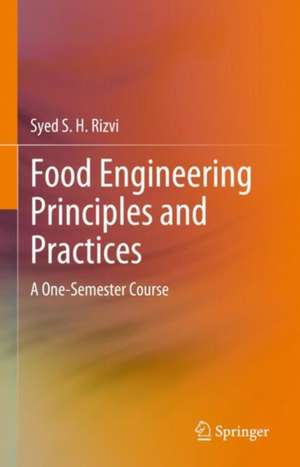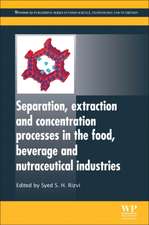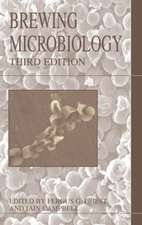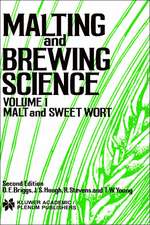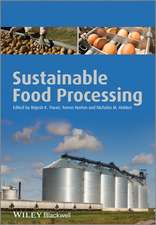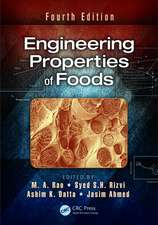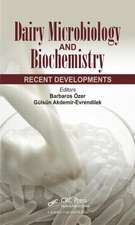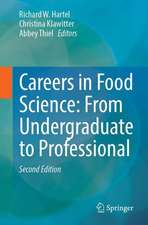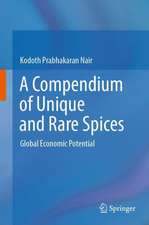Food Engineering Principles and Practices: A One-Semester Course
Autor Syed S. H. Rizvien Limba Engleză Hardback – 8 mar 2024
This textbook equips readers to understand a diversity of food engineering related topics and each chapter is enriched with practical examples and Check Your Understanding sections, as well as several problems. The textbook is aimed at undergraduate food science students in their first required introductory food engineering course, but practitioners involved in designing, optimizing, and managing the processing of food products will also find it a useful account.
Preț: 745.15 lei
Preț vechi: 908.72 lei
-18% Nou
Puncte Express: 1118
Preț estimativ în valută:
142.60€ • 148.33$ • 117.73£
142.60€ • 148.33$ • 117.73£
Carte tipărită la comandă
Livrare economică 14-28 aprilie
Preluare comenzi: 021 569.72.76
Specificații
ISBN-13: 9783031341229
ISBN-10: 3031341228
Pagini: 528
Ilustrații: XXIV, 528 p. 1 illus.
Dimensiuni: 155 x 235 mm
Greutate: 0.95 kg
Ediția:2024
Editura: Springer International Publishing
Colecția Springer
Locul publicării:Cham, Switzerland
ISBN-10: 3031341228
Pagini: 528
Ilustrații: XXIV, 528 p. 1 illus.
Dimensiuni: 155 x 235 mm
Greutate: 0.95 kg
Ediția:2024
Editura: Springer International Publishing
Colecția Springer
Locul publicării:Cham, Switzerland
Cuprins
Chapter 1: Basic Concepts and Material Properties.- Chapter 2: Systems, Processes and Phase Equilibria.- Chapter 3: Thermodynamics: Basic Concepts.- Chapter 4: Mass and Energy Balances.- Chapter 5: Fluid Mechanics: Basic Concepts.- Chapter 6: Fluid Mechanics: Applications.- Chapter 7: Heat Transfer: Steady State Conduction.- Chapter 8: Heat Transfer: Steady State Convection.- Chapter 9: Heat Transfer: Unsteady State.- Chapter 10: Heat Transfer: Radiation, Dielectric and Ohmic.- Chapter 11: Mass Transfer: Basic Concepts.- Chapter 12: Refrigeration.- Chapter 13: Psychrometrics.
Notă biografică
Syed S. H. Rizvi is an International Professor of Food Process Engineering at Cornell University and has served as Director of Graduate Studies of the Field of Food Science & Technology. He is also Adjunct Professor in the School of Chemical and Biomolecular Engineering at Cornell, and in the Department of Chemical Engineering, at the University of Toronto in Canada, and he has been a Visiting Professor at several universities including Bogor Agricultural University (Indonesia), the Institute of Food Technology (Brazil) and the University of Toronto. Professor Rizvi teaches courses devoted to engineering and processing aspects of food science and related biomaterials. His main research focuses on experimental and theoretical aspects of bioseperation processes using supercritical fluids and membranes, cryogenic freezing, bioactive delivery systems, high pressure extrusion with supercritical carbon dioxide, physical and engineering properties of biomaterials, and novelfood processing technologies. He has published 200+ technical articles, co-authored/edited eight books, holds nine patents, and serves on the editorial boards of several journals. He was selected as a Jefferson Science Fellow by the National Academy of Sciences and served as a Senior Science Adviser at the U.S. Department of State in Washington DC in 2007-2008. He received the Excellence in Teaching Award in 1991, 2014, and 2019 by the Food Science Advisory Council at Cornell University, and other academic honors including the Institute of Food Technologists’ Marcel Loncin Research Prize (2000) and the Bor S. Luh International Award (2010), the Stanley Watson Award from the Processing and Engineering Division of the AACCI (2012), the International Association for Engineering and Food (IAEF) Lifetime Achievement Award (2019), the American Society of Agricultural and Biological Engineers International Food Engineering award (2021) and the Career Accomplishment awardfrom the College of Agriculture and Life Sciences at Cornell University (2021).
Textul de pe ultima copertă
This textbook is designed for a one-semester course on Food Engineering, and it offers a concise, in-depth and integrated introduction to the fundamental engineering and physicochemical principles and practices of utility in food processing and manufacturing operations. The textbook includes topics mandated by the Institute of Food Technologists for accreditation of Food Science curricula and helps prepare the students better for taking advance courses related to unit operations in food manufacturing. It is also relevant for Food Process Engineering courses, containing materials that most instructors can cover in three semester hours of instruction. In the first three chapters, readers will find an overview of the basic knowledge of physics and chemistry and an introduction to the engineering language needed to eliminate confusion going forward. In the following chapters, the author covers the main concepts of food thermodynamics, heat transfer–radiation in food materials, mass transfer and fluid dynamics in food, along with real-life examples and exercises to help students relate better to the topics. The author also gives a brief introduction to the main mathematical and analytical concepts required in food engineering.
This textbook equips readers to understand a diversity of food engineering related topics and each chapter is enriched with practical examples and Check Your Understanding sections, as well as several problems. The textbook is aimed at undergraduate food science students in their first required introductory food engineering course, but practitioners involved in designing, optimizing, and managing the processing of food products will also find it a useful account.
This textbook equips readers to understand a diversity of food engineering related topics and each chapter is enriched with practical examples and Check Your Understanding sections, as well as several problems. The textbook is aimed at undergraduate food science students in their first required introductory food engineering course, but practitioners involved in designing, optimizing, and managing the processing of food products will also find it a useful account.
Caracteristici
Explains food engineering and physicochemical fundamentals Includes numerous real-life examples and exercises Organised for one-semester course lectures
